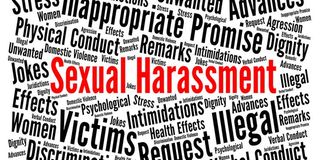Awareness on sexual harassment matters now, more than ever

What you need to know:
According to Uganda Police 2019 Report released in March, a total of 1,531 were victims of rape, 688 suspects of rape were discharged in Court, 20 were convicted, 6 were acquitted and 15 discharged while 647 are still awaiting trial
Sexual harassment is a devastating and pervasive crime that directly affects women, men and children in Uganda and touches lives of nearly all individuals. It is one of the most underreported crimes. Many victims fear retaliation, think that nothing will change, concerns that may be heightened when the perpetrators hold a position of power.
According to Uganda Police 2019 Report released in March, a total of 1,531 were victims of rape, 688 suspects of rape were discharged in Court, 20 were convicted, 6 were acquitted and 15 discharged while 647 are still awaiting trial. For our own purposes, there are other common forms of sexual harassment in Uganda, and these include defilement, forced sex, noises with sexual intonations directed at women or girls in public (hissing, kissing, whistling sound), ogling at women’s bodies, verbal harassment of sexually explicit nature, molestation (touching) and stalking. Sexual harassment awareness in Uganda remains a neglected issue and is looked upon as an expected part of everyday life.
At least one in six women and one in 33 men reported experiencing sex harassment at some time in their lives. One in every four women experience at least one physical assault by a partner during adulthood; and people aged 16 – 24 are raped and sexually assaulted of rates higher than any other age group.
Some people get harassed physically, some emotionally and others psychologically. Harassment cases are increasing day by day even when there are provisions against it. The cost of this type of violence has been reflected in serious personal health, social and economic repercussions as it inadvertently affects lifestyle choices, social capital and ability of women to continue education or join the workplace. Ultimately, in Uganda, it shrinks economic growth, and eats into public budgets.
I’m encouraged that some people are speaking out against sexual harassment
For those of us who care about the issue – who care about ending sexual harassment and the suffering it causes – it can be painful, tiring and discouraging to keep up with the news. It has now become a normal thing for people in our society.
The gap of understanding between men and women grows as reports of sexual harassment continue. Men accused of the act have been perfunctorily fired from their positions, and in some cases, without a whimper or offer of defence. Their silence carries a remarkable denial of guilt. But isn’t it also denial of their own understanding of sexual harassment. If men are also left to contend, by their silence, that nothing occurred and take a martyr’s stance by job loss, we gain nothing. Is that really the way we want to go?
While it’s important that guilty persons face consequences for their actions, I believe that we must also go beyond individual accountability. For this reason, we should start conversations about what sexual harassment is, how to prevent it, and how to support survivors who have experienced it. The issue should increase pressure on politicians and lawmakers to clearly take a stand on sexual harassment.
We make this society so we can also change it by awareness. Beyond defining criminal violations and fireable offenses, it’s important to clearly identify the values in the community. Therefore, as we look toward the future, I believe educating and sensitizing people is the biggest stone in addressing sexual harassment in Uganda.
Zainab Nantume Ssebuliba,
Mega Vision Association




